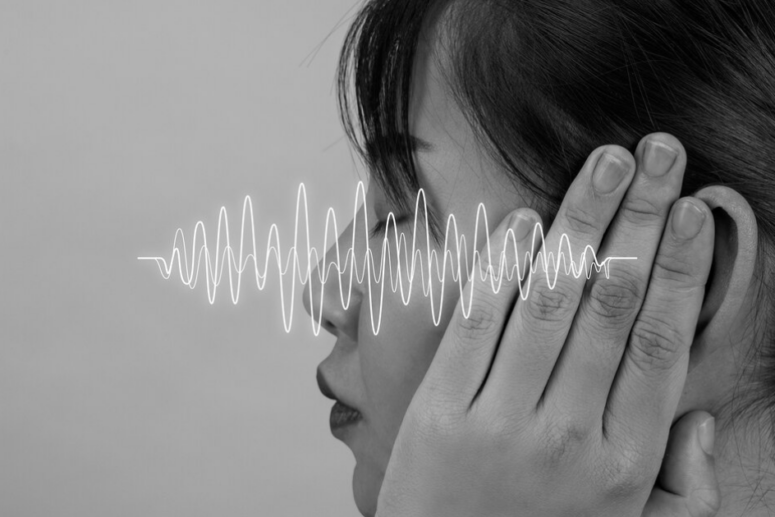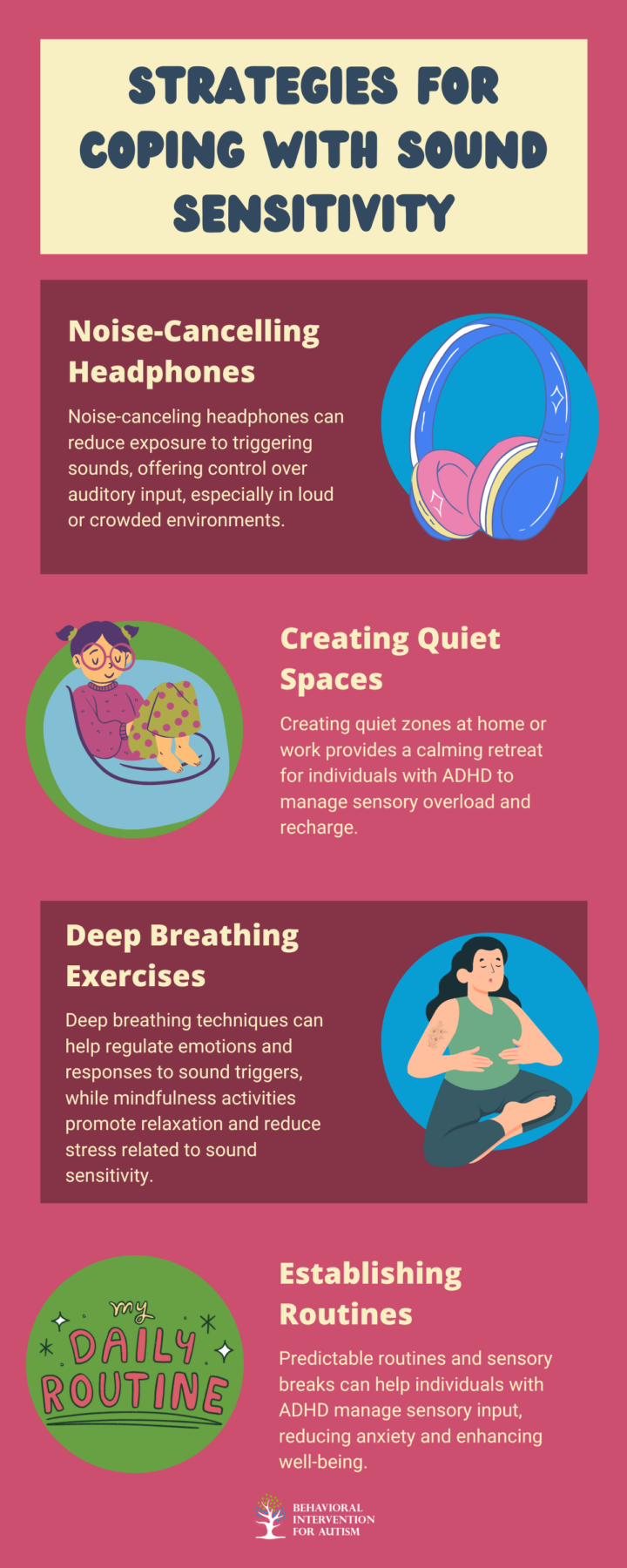
Table of Contents
Sound sensitivity is a complex phenomenon that can significantly impact individuals, especially those with conditions like ADHD.
By understanding the various types of sound sensitivity and its effects on individuals, we can better support those experiencing these challenges.
Types of Sound Sensitivity
Sound sensitivity can manifest in different forms, including hyperacusis, misophonia, and general hypersensitivity. These variations in sound sensitivity can have distinct effects on individuals’ responses to auditory stimuli.
Type of Sound Sensitivity | Description |
Hyperacusis | Heightened sensitivity to sound, often resulting in discomfort or pain even at normal sound levels. Individuals with hyperacusis may struggle with everyday noises that others find tolerable. |
Misophonia | A strong aversion or emotional response to specific sounds, such as chewing or tapping. Misophonia can trigger intense negative emotions, leading to stress and discomfort. |
Hypersensitivity | Generalized sensitivity to various stimuli, including auditory, visual, and olfactory inputs. Individuals may feel easily overwhelmed by environmental stimuli, affecting their overall well-being. |
Impact of Sound Sensitivity on Individuals
The impact of sound sensitivity on individuals, particularly those with ADHD, can be profound. While ADHD itself does not directly cause sound sensitivity, individuals with ADHD may experience heightened reactivity to noise due to physiological and psychological factors.
Effect of Sound Sensitivity | Description |
Emotional Reactions | Sound sensitivities can trigger emotional responses like irritation, overwhelm, exhaustion, and feelings of unwellness. Individuals may struggle to concentrate or feel agitated in noisy environments. |
Sensory Overload | Sound sensitivity, along with other sensory issues, can lead to sensory overload, where individuals become overwhelmed by stimuli in their environment. This overload can contribute to anxiety and challenges in regulating emotions. |
Perception Discrepancies | Hyperacusis and misophonia can distort one’s perception of sound intensity. Individuals may perceive normal sounds as excessively loud or unpleasant, impacting their comfort and well-being. |
Sound Sensitivity in ADHD
Exploring the relationship between ADHD and sound sensitivity reveals various auditory challenges faced by individuals with this condition.
While not everyone with ADHD experiences sound sensitivity, many exhibit symptoms of misophonia, hyperacusis, or general hypersensitivity to auditory stimuli.
Association Between ADHD and Misophonia
Misophonia, a condition characterized by an intense aversion to specific sounds like chewing or yawning, can frequently co-occur with ADHD. Individuals with ADHD and misophonia may find certain everyday noises intolerable, leading to emotional distress and difficulty focusing. Misophonia can exacerbate the challenges already present in managing ADHD symptoms, impacting both personal and social interactions.
Hyperacusis and ADHD
Hyperacusis, another auditory condition associated with heightened sensitivity to sound, can also affect individuals with ADHD. In some cases, hyperacusis can lead to a reduced tolerance for sounds of average intensity and distort one’s perception of loudness. This heightened sensitivity may result in anxiety, discomfort, and, in severe instances, phonophobia, where individuals actively avoid environments with specific sounds.
While ADHD itself does not directly cause sound sensitivity, the presence of comorbid conditions like misophonia or autism can contribute to increased sensory reactivity in individuals with ADHD. Sound sensitivities can trigger emotional responses such as irritation, overwhelm, exhaustion, and a general feeling of discomfort, further complicating the management of ADHD symptoms.
It is worth noting that research has delved into the effects of beta frequency binaural-beat audio signals on human memory, including individuals with ADHD. Such investigations underscore the complex interplay between auditory stimuli and cognitive processes in individuals with neurodevelopmental disorders like ADHD. Recognizing and addressing sound sensitivity in individuals with ADHD is crucial for providing comprehensive care and support tailored to their specific sensory needs.

Treatments for Sound Sensitivity
Addressing sound sensitivity, especially in the context of conditions like ADHD, requires specific treatments to help individuals manage their symptoms effectively.
Two common therapeutic approaches for sound sensitivity are Cognitive Behavioral Therapy (CBT) and Sound Therapy for ADHD.
Cognitive Behavioral Therapy (CBT)
Cognitive Behavioral Therapy (CBT) is a widely recognized therapeutic approach used to treat various mental health conditions, including sound sensitivity disorders like misophonia and hyperacusis. In the case of sound sensitivity, CBT aims to reframe negative thoughts and behaviors associated with sound triggers, helping individuals develop healthier coping mechanisms.
CBT sessions typically involve identifying triggers, understanding emotional responses to sound stimuli, and learning strategies to modify behavioral reactions. By addressing the underlying cognitive processes related to sound sensitivity, individuals with ADHD can gradually reduce their distress levels and improve their overall quality of life.
Sound Therapy for ADHD
Sound therapy is essential in ADHD treatment, helping to retrain the auditory processing center for better sound tolerance and processing. This therapy exposes individuals to specific sound frequencies or patterns, desensitizing them to sound triggers and reducing the emotional and physiological responses linked to sound sensitivity.
Studies have shown that auditory stimulation can impact cognitive functions, such as memory and attention, especially in individuals with ADHD. By incorporating sound therapy techniques tailored to the unique sensory needs of individuals with ADHD, it is possible to enhance their auditory processing abilities and mitigate the disruptive effects of sound sensitivity on their daily functioning.
Managing Sound Sensitivity
Sound sensitivity can significantly impact individuals with ADHD, leading to challenges in daily life.
Understanding effective strategies for coping with sound sensitivity and recognizing its effects on attention are crucial for managing this sensory issue in individuals with ADHD.
Strategies for Coping with Sound Sensitivity
Individuals with ADHD can employ various strategies to manage sound sensitivity. Effective coping mechanisms include:

Effects of Sound Sensitivity on Attention
Sound sensitivity can have a profound impact on attention and focus for individuals with ADHD. Heightened reactivity to auditory stimuli can lead to distraction, reduced concentration, and increased difficulty in maintaining attention on tasks. The effects of sound sensitivity on attention include:
- Impaired concentration: Background noise or sudden loud sounds can disrupt concentration and hinder the ability to focus on specific tasks. Individuals with ADHD may struggle to filter out irrelevant auditory stimuli, making it challenging to stay on task.
- Decreased productivity: Sound sensitivity can decrease productivity levels as individuals may require additional time and effort to regain focus after being exposed to triggering sounds. This can result in delays in completing tasks and achieving goals.
- Fatigue and stress: Prolonged exposure to triggering sounds can lead to fatigue, stress, and emotional exhaustion in individuals with ADHD. The constant alertness and hyper-awareness required to manage sound sensitivity can drain mental energy and contribute to feelings of overwhelm.
Effective coping strategies and an awareness of sound sensitivity’s impact on attention can help individuals with ADHD navigate sensory challenges. Creating a supportive environment that considers these sensitivities enhances their overall well-being and quality of life.
Sound sensitivity is a common challenge for individuals with ADHD, impacting their daily lives and interactions. Understanding how this sensitivity manifests can help us provide effective strategies to support those affected. Behavioral Intervention for Autism offers tailored ABA programs in Florida that address sound sensitivity by focusing on individualized strategies to enhance coping skills.
Our dedicated team is committed to creating a positive learning environment, ensuring that each person feels understood and supported. If you’re seeking guidance on managing sound sensitivity or want to explore our ABA programs, reach out to us today and discover how we can assist you on this journey.
- 9 Common Obsessions of Children With Autism You Should Know - February 25, 2025
- What is Neurodiversity? A Guide to Embracing Differences - February 25, 2025
- Understanding Hyperfocus in Autism: What It Means and Why It Happens - February 25, 2025
